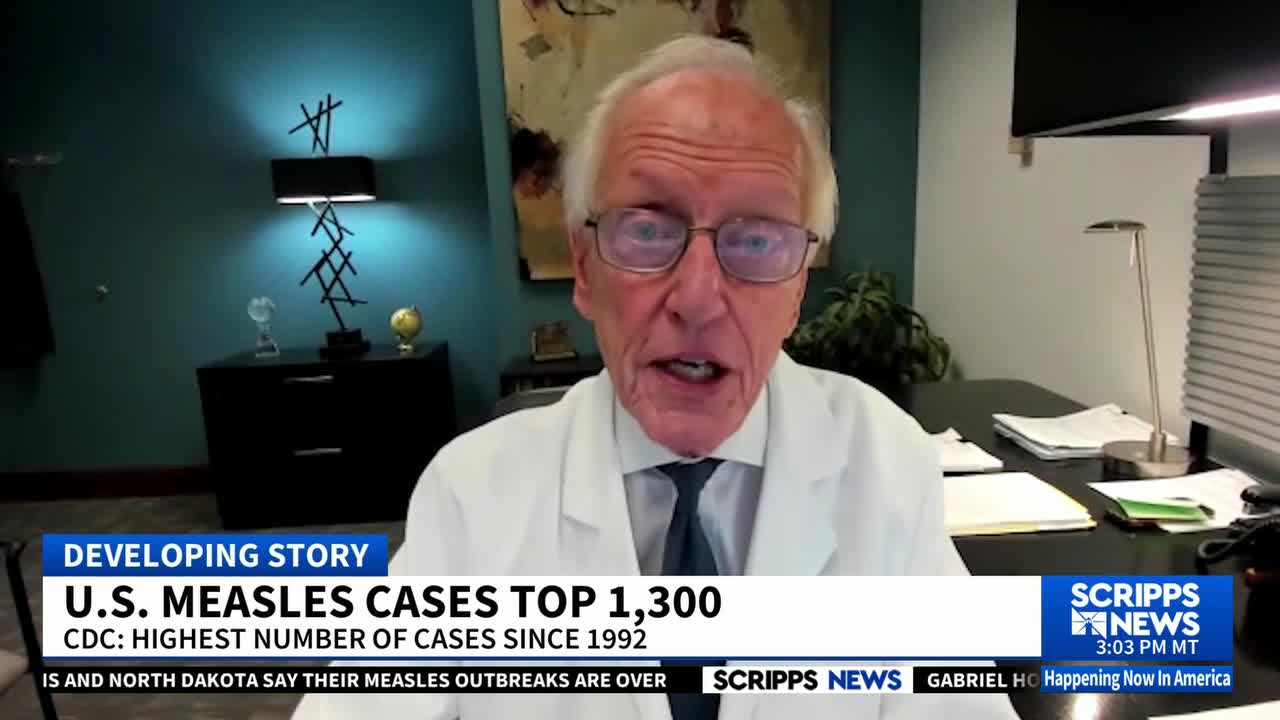Measles cases in the United States have surged to a 33-year high, with over 1,300 confirmed infections this year, according to data released Wednesday from the Centers for Disease Control and Prevention. This marks a milestone in the spread of a preventable disease once thought to be eliminated in the U.S.
Cases have been reported in 39 states and the District of Columbia. The cases have resulted in the deaths of at least three people and have left 164 hospitalized. An alarming 92% of the cases were found in unvaccinated individuals, according to the Centers for Disease Control and Prevention.
Dr. William Schaffner, professor of medicine and infectious diseases at Vanderbilt University, warned that measles could lose its status as an eliminated disease in the U.S. if the outbreak continues.
RELATED STORY | Measles cases skyrocket in US, reaching 33-year high amid vaccination concerns
"It's affecting groups of children who've been withheld from vaccination," he said. "And this most contagious virus is taking advantage of that. It's spreading to all of these unvaccinated children, and it could continue to do that. And if it continues for more than a year, we will lose our status as having eliminated measles in the United States, which would be a great, unfortunate event, because we were the first to eliminate measles back in 2000."
Dr. Jonathan Temte, associate dean for public health and community engagement at the University of Wisconsin School of Medicine and Public Health, said that the resurgence is partly due to the erosion of public confidence in science and public health systems, fueled by misinformation.
"It really is made more difficult when you don't have an intact public health system, when you don't have a population that believes in evidence-based science and is wracked with concerns about conspiracy, and you have people who basically profiteer off misinformation," Temte said.
Schaffner said that everyone who is able to has a responsibility to get them and their children vaccinated.
"We also have a responsibility to make our communities safe. And we have to try to make parents comfortable and reassured that that is an important thing for them to do," he said.
In a letter last week, Senate minority leader Chuck Schumer called on Health Secretary Robert F. Kennedy, Jr., to immediately declare a public health emergency for measles.
But Kennedy says he's not concerned right now:
"We've done a very, very good job at controlling it," Kennedy said. "We don't at this point consider it a national emergency."
RELATED STORY | As measles spreads to another state, how early can babies be vaccinated?
Health officials continue to advocate for the MMR vaccine as the most effective means to combat the deadly and highly contagious virus. The shots are reported to be 97% effective, preventing illness and further spread of the disease.
The CDC reported that only 8% of those with confirmed cases had a known measles vaccine.
Children are routinely vaccinated for measles at 12 to 15 months and again at 4 to 6 years of age — before going to kindergarten — but children as young as 6 months old can receive the measles vaccine if they are at risk.
According to the CDC, measles causes the following symptoms:
- Pneumonia
- Brain Damage
- Blindness
- Deafness
- Diarrhea
- Premature birth or low-birthweight baby (in unvaccinated pregnant women who contract measles during pregnancy)
- Measles infection leads to loss of immunity to other deadly diseases
The World Health Organization says that herd immunity against measles can be reached when a community achieves a 95% vaccination rate. U.S. health officials estimate that 92.7% of kindergarten students were vaccinated last school year.
U.S. Health and Human Services Secretary Robert F. Kennedy Jr. has encouraged people to get vaccinated against the disease, but has given mixed messages about his support for the vaccine. He said his position and the federal government's stance are that the government should not be mandating people to get the vaccine.
Schaffner is optimistic that doctors can help patients understand the benefits of vaccination.
"I think we doctors have to listen to our patients, take the time to answer their questions, respond and then provide reassurance that vaccination is important. You know, as I like to say, disease is bad, vaccination, good," he said.





